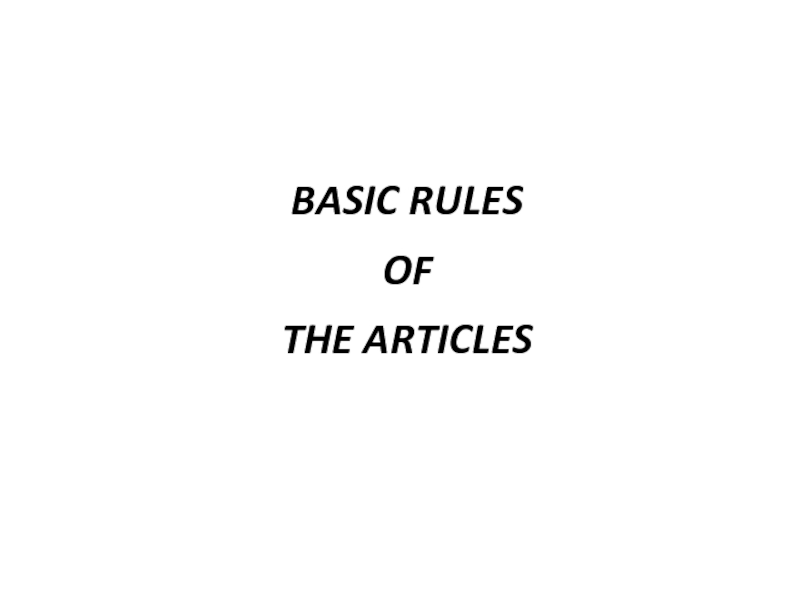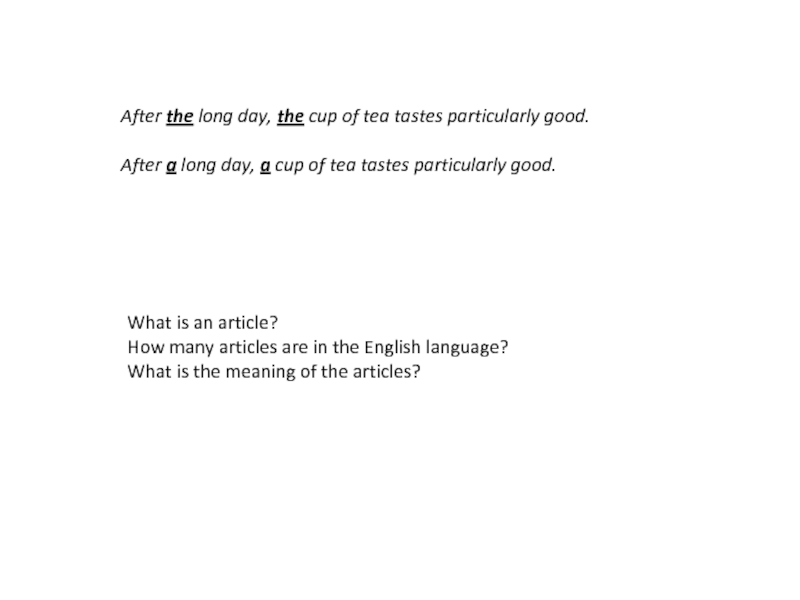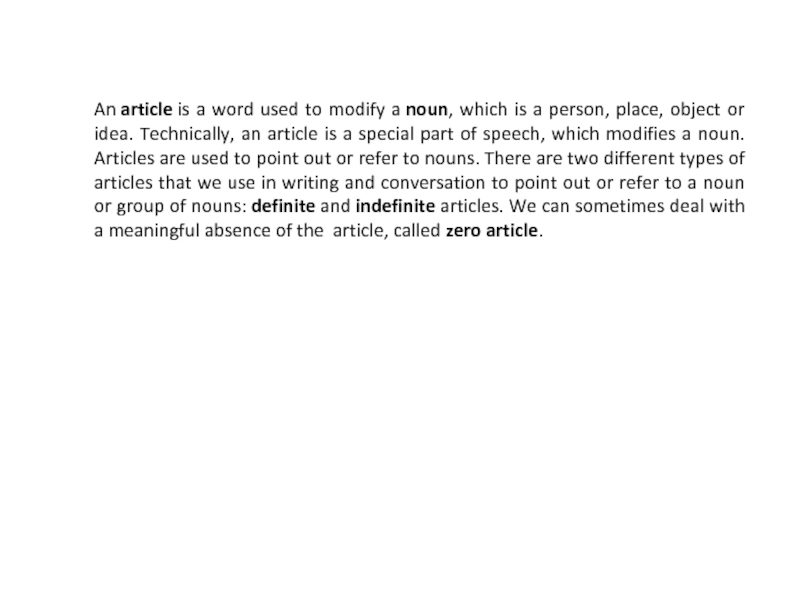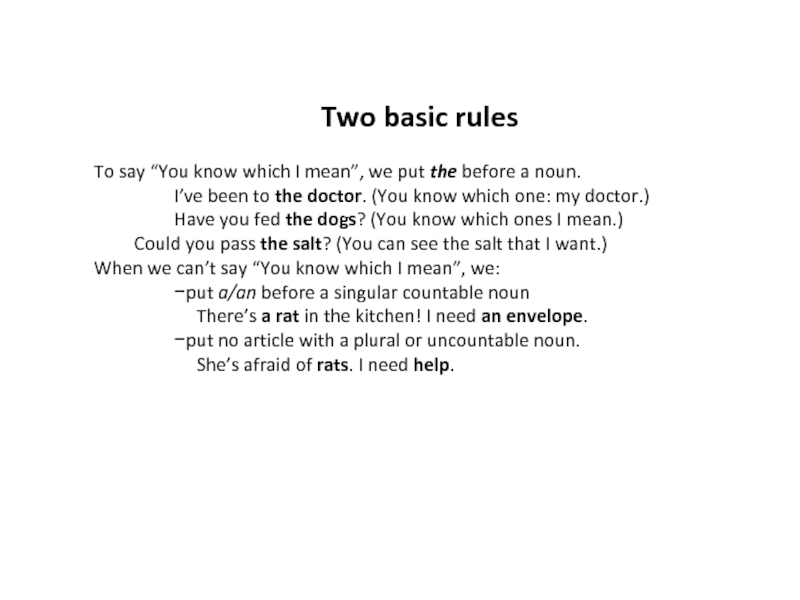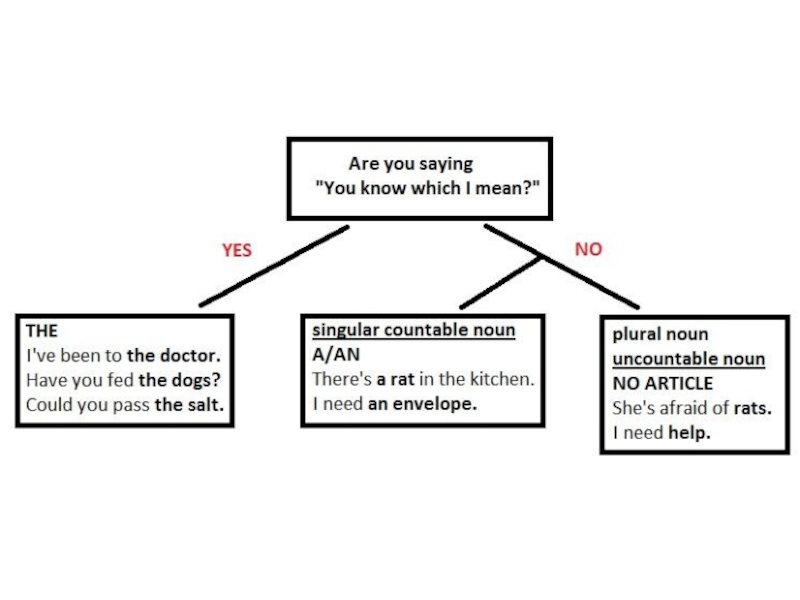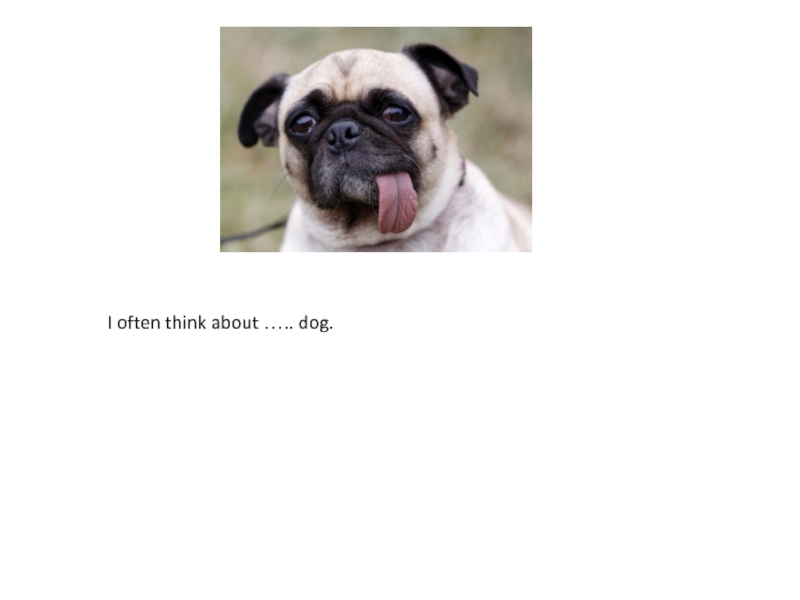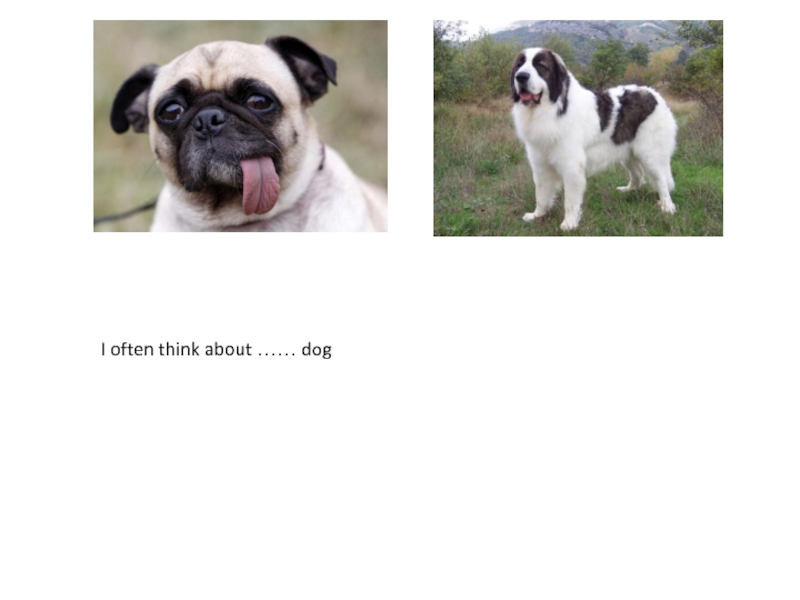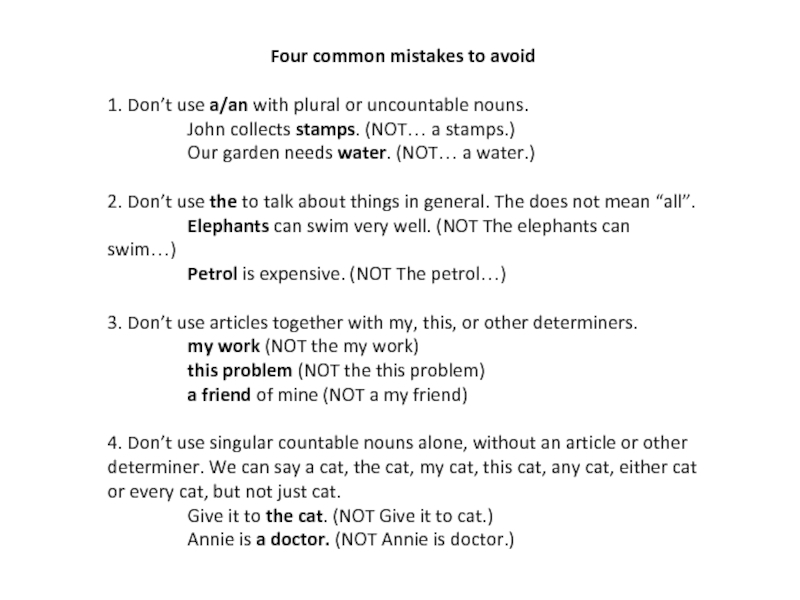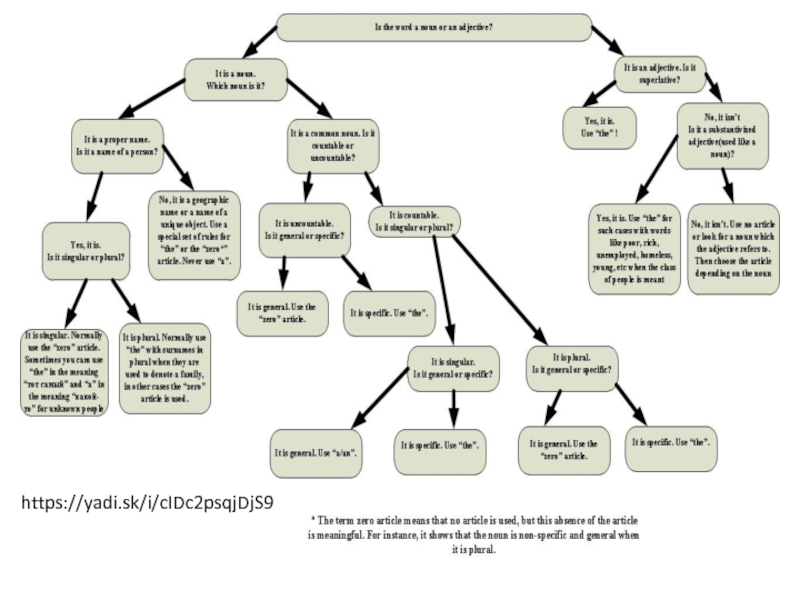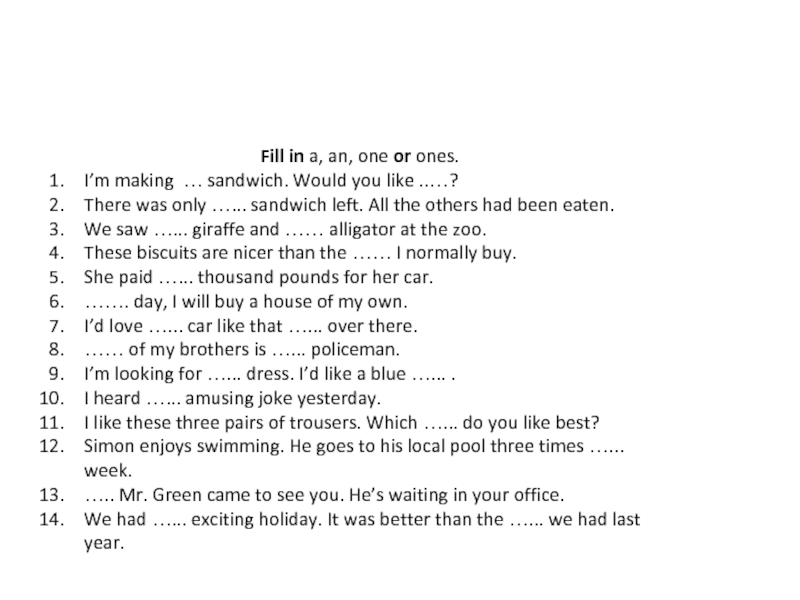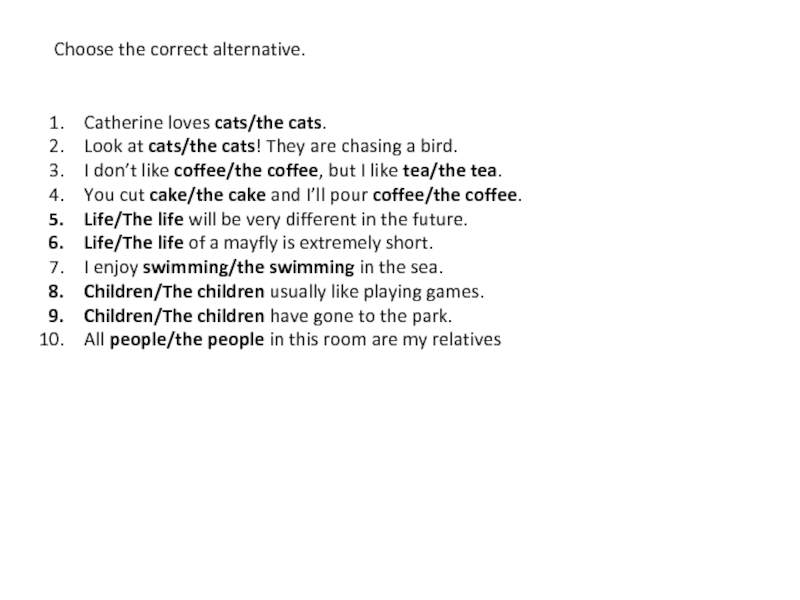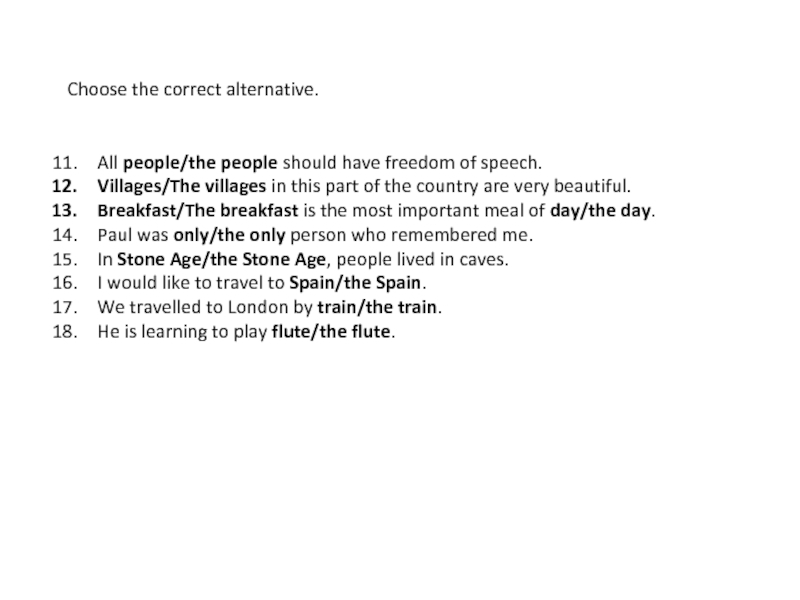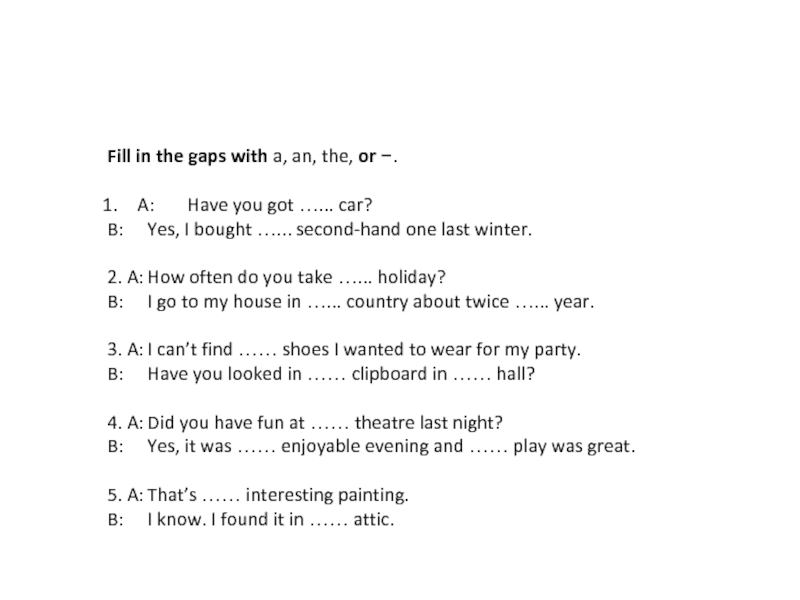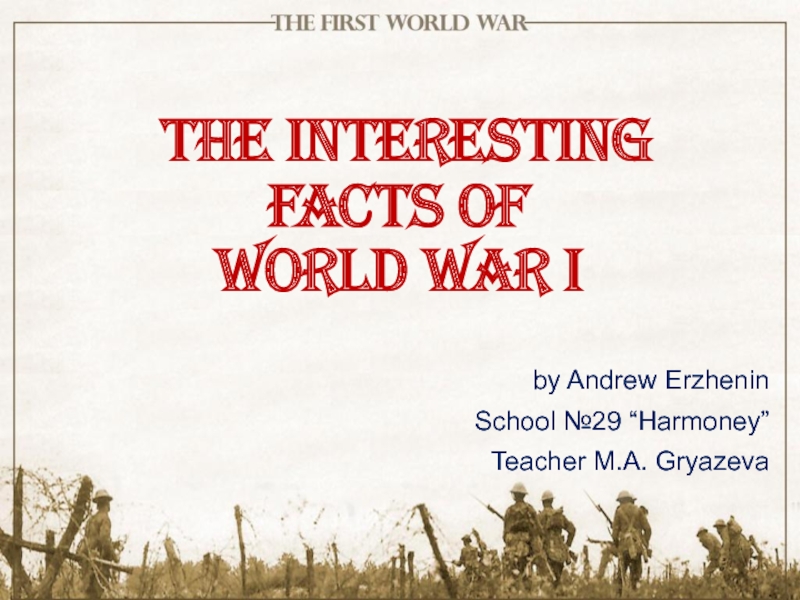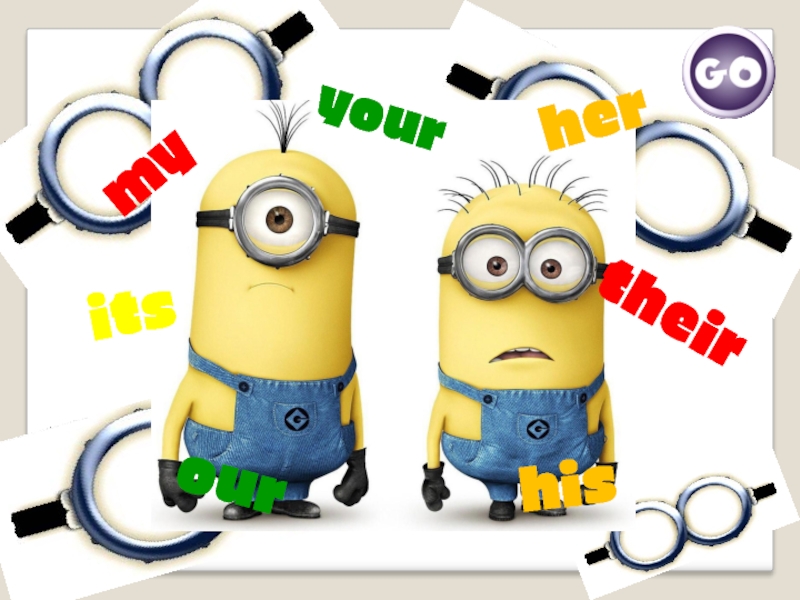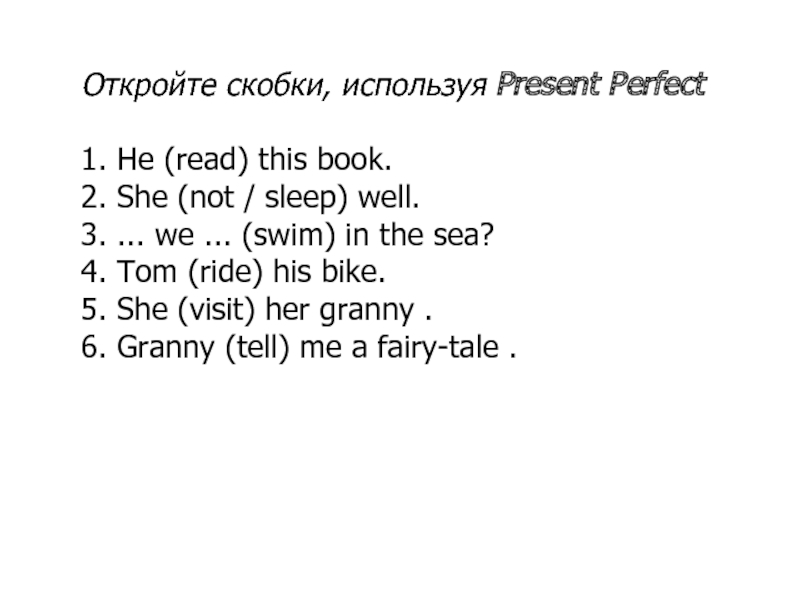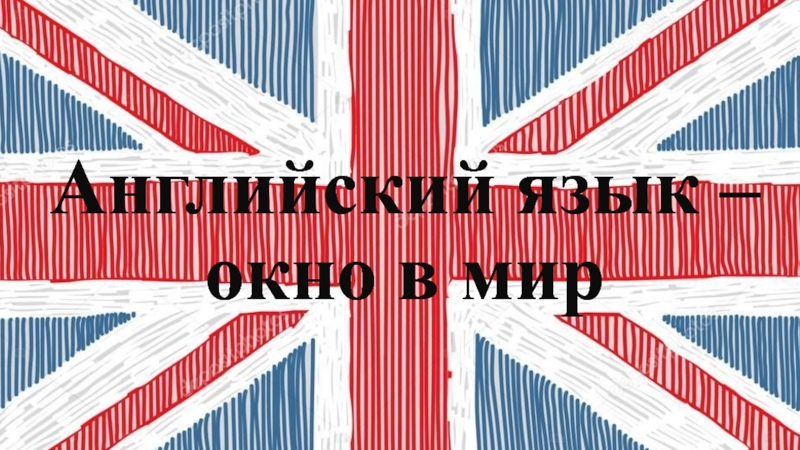- Главная
- Разное
- Дизайн
- Бизнес и предпринимательство
- Аналитика
- Образование
- Развлечения
- Красота и здоровье
- Финансы
- Государство
- Путешествия
- Спорт
- Недвижимость
- Армия
- Графика
- Культурология
- Еда и кулинария
- Лингвистика
- Английский язык
- Астрономия
- Алгебра
- Биология
- География
- Детские презентации
- Информатика
- История
- Литература
- Маркетинг
- Математика
- Медицина
- Менеджмент
- Музыка
- МХК
- Немецкий язык
- ОБЖ
- Обществознание
- Окружающий мир
- Педагогика
- Русский язык
- Технология
- Физика
- Философия
- Химия
- Шаблоны, картинки для презентаций
- Экология
- Экономика
- Юриспруденция
Basic rules of the articles презентация
Содержание
- 1. Basic rules of the articles
- 2. After the long day, the cup of tea tastes particularly good.
- 3. An article is a word used to modify a noun,
- 4. Two basic rules To say “You
- 6. I often think about ….. dog.
- 7. I often think about …… dog
- 8. I often speak about ……. world.
- 9. Four common mistakes to avoid 1.
- 10. https://yadi.sk/i/cIDc2psqjDjS9
- 11. Fill in a, an, one or ones.
- 12. Choose the correct alternative. Catherine
- 13. Choose the correct alternative. All
- 14. Fill in the gaps with a, an,
Слайд 2After the long day, the cup of tea tastes particularly good.
After a long day, a cup of tea tastes
particularly good.
What is an article?
How many articles are in the English language?
What is the meaning of the articles?
Слайд 3An article is a word used to modify a noun, which is a person,
place, object or idea. Technically, an article is a special part of speech, which modifies a noun. Articles are used to point out or refer to nouns. There are two different types of articles that we use in writing and conversation to point out or refer to a noun or group of nouns: definite and indefinite articles. We can sometimes deal with a meaningful absence of the article, called zero article.
Слайд 4Two basic rules
To say “You know which I mean”, we put
the before a noun.
I’ve been to the doctor. (You know which one: my doctor.)
Have you fed the dogs? (You know which ones I mean.)
Could you pass the salt? (You can see the salt that I want.)
When we can’t say “You know which I mean”, we:
−put a/an before a singular countable noun
There’s a rat in the kitchen! I need an envelope.
−put no article with a plural or uncountable noun.
She’s afraid of rats. I need help.
I’ve been to the doctor. (You know which one: my doctor.)
Have you fed the dogs? (You know which ones I mean.)
Could you pass the salt? (You can see the salt that I want.)
When we can’t say “You know which I mean”, we:
−put a/an before a singular countable noun
There’s a rat in the kitchen! I need an envelope.
−put no article with a plural or uncountable noun.
She’s afraid of rats. I need help.
Слайд 9Four common mistakes to avoid
1. Don’t use a/an with plural or
uncountable nouns.
John collects stamps. (NOT… a stamps.)
Our garden needs water. (NOT… a water.)
2. Don’t use the to talk about things in general. The does not mean “all”.
Elephants can swim very well. (NOT The elephants can swim…)
Petrol is expensive. (NOT The petrol…)
3. Don’t use articles together with my, this, or other determiners.
my work (NOT the my work)
this problem (NOT the this problem)
a friend of mine (NOT a my friend)
4. Don’t use singular countable nouns alone, without an article or other determiner. We can say a cat, the cat, my cat, this cat, any cat, either cat or every cat, but not just cat.
Give it to the cat. (NOT Give it to cat.)
Annie is a doctor. (NOT Annie is doctor.)
John collects stamps. (NOT… a stamps.)
Our garden needs water. (NOT… a water.)
2. Don’t use the to talk about things in general. The does not mean “all”.
Elephants can swim very well. (NOT The elephants can swim…)
Petrol is expensive. (NOT The petrol…)
3. Don’t use articles together with my, this, or other determiners.
my work (NOT the my work)
this problem (NOT the this problem)
a friend of mine (NOT a my friend)
4. Don’t use singular countable nouns alone, without an article or other determiner. We can say a cat, the cat, my cat, this cat, any cat, either cat or every cat, but not just cat.
Give it to the cat. (NOT Give it to cat.)
Annie is a doctor. (NOT Annie is doctor.)
Слайд 11Fill in a, an, one or ones.
I’m making … sandwich. Would
you like ..…?
There was only …... sandwich left. All the others had been eaten.
We saw …... giraffe and …… alligator at the zoo.
These biscuits are nicer than the …… I normally buy.
She paid …... thousand pounds for her car.
……. day, I will buy a house of my own.
I’d love …... car like that …... over there.
…… of my brothers is …... policeman.
I’m looking for …... dress. I’d like a blue …... .
I heard …... amusing joke yesterday.
I like these three pairs of trousers. Which …... do you like best?
Simon enjoys swimming. He goes to his local pool three times …... week.
….. Mr. Green came to see you. He’s waiting in your office.
We had …... exciting holiday. It was better than the …... we had last year.
There was only …... sandwich left. All the others had been eaten.
We saw …... giraffe and …… alligator at the zoo.
These biscuits are nicer than the …… I normally buy.
She paid …... thousand pounds for her car.
……. day, I will buy a house of my own.
I’d love …... car like that …... over there.
…… of my brothers is …... policeman.
I’m looking for …... dress. I’d like a blue …... .
I heard …... amusing joke yesterday.
I like these three pairs of trousers. Which …... do you like best?
Simon enjoys swimming. He goes to his local pool three times …... week.
….. Mr. Green came to see you. He’s waiting in your office.
We had …... exciting holiday. It was better than the …... we had last year.
Слайд 12Choose the correct alternative.
Catherine loves cats/the cats.
Look at cats/the cats! They
are chasing a bird.
I don’t like coffee/the coffee, but I like tea/the tea.
You cut cake/the cake and I’ll pour coffee/the coffee.
Life/The life will be very different in the future.
Life/The life of a mayfly is extremely short.
I enjoy swimming/the swimming in the sea.
Children/The children usually like playing games.
Children/The children have gone to the park.
All people/the people in this room are my relatives
I don’t like coffee/the coffee, but I like tea/the tea.
You cut cake/the cake and I’ll pour coffee/the coffee.
Life/The life will be very different in the future.
Life/The life of a mayfly is extremely short.
I enjoy swimming/the swimming in the sea.
Children/The children usually like playing games.
Children/The children have gone to the park.
All people/the people in this room are my relatives
Слайд 13Choose the correct alternative.
All people/the people should have freedom of speech.
Villages/The
villages in this part of the country are very beautiful.
Breakfast/The breakfast is the most important meal of day/the day.
Paul was only/the only person who remembered me.
In Stone Age/the Stone Age, people lived in caves.
I would like to travel to Spain/the Spain.
We travelled to London by train/the train.
He is learning to play flute/the flute.
Breakfast/The breakfast is the most important meal of day/the day.
Paul was only/the only person who remembered me.
In Stone Age/the Stone Age, people lived in caves.
I would like to travel to Spain/the Spain.
We travelled to London by train/the train.
He is learning to play flute/the flute.
Слайд 14Fill in the gaps with a, an, the, or −.
A: Have you
got …... car?
B: Yes, I bought …... second-hand one last winter.
2. A: How often do you take …... holiday?
B: I go to my house in …... country about twice …... year.
3. A: I can’t find …… shoes I wanted to wear for my party.
B: Have you looked in …… clipboard in …… hall?
4. A: Did you have fun at …… theatre last night?
B: Yes, it was …… enjoyable evening and …… play was great.
5. A: That’s …… interesting painting.
B: I know. I found it in …… attic.
B: Yes, I bought …... second-hand one last winter.
2. A: How often do you take …... holiday?
B: I go to my house in …... country about twice …... year.
3. A: I can’t find …… shoes I wanted to wear for my party.
B: Have you looked in …… clipboard in …… hall?
4. A: Did you have fun at …… theatre last night?
B: Yes, it was …… enjoyable evening and …… play was great.
5. A: That’s …… interesting painting.
B: I know. I found it in …… attic.
